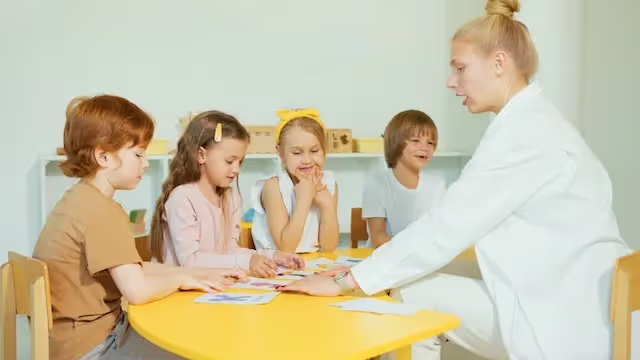Naturalistic Teaching Strategies In ABA Therapy
Naturalistic teaching is a style of teaching that can be applied to different environments, not only one that's built around a therapy session at a therapy center.
.avif)

What is Naturalistic Teaching?
Naturalistic teaching is a style of teaching that can be applied to different environments, not only one that's built around a therapy session at a therapy center.
One primary characteristic of naturalistic teaching is where it can take place, which can be at the client's home, at a school, or inside of any building where a child would be, such as a grocery store.
The goal of naturalistic teaching is to utilize the child's natural environment to help promote generalization.
This can help encourage kids with autism to take part in the conversation and become thrilled over the subject. Naturalistic teaching can boost social skills in ways where other teaching methods may fail.
Although naturalistic teaching is founded in much of the teachings of Applied Behavior Analysis, It hones in more on specific experiences of the children that take part in it.
It's highly personalized, where one child's real activities and schedules determine how a therapist will work with a child, and in what setting it'll take place.
This can help therapists better focus themselves on target behaviors that are associated with contributions to such behaviors springing forth.
Types of Naturalistic Teaching Methods
Here are the different types of naturalistic teaching Methods:
Incidental Teaching
This is where the objective of the raise the motivation in a child to learn new things in new, exciting ways.
Using incidental teaching, the therapist may cue a child to say a phrase or demand a toy to be given to them. In most cases like this, the child will show interest in the toy on their own accord.
The therapist is interested in boosting the child's ability to conversate, however. Communication doesn't have to be verbal and can be done with sign language, hand gestures, or with photos.
Read More: What Is Incidental Teaching?
Pivotal Response Training
Pivotal response training/treatment doesn't pay much attention to specific behaviors, such as getting a kid to talk. Instead, a broader approach is taken by viewing things that are important to their behavioral development.
Whatever motivates unwanted behavior or how they react to different social interactions. The objective is to find the because of behaviors instead of just single behaviors individually.
Read More: What Is Pivotal Response Treatment?
Natural Language Paradigm
This is useful for kids that are semi or completely unable to talk. With Natural Language Paradigm, the therapist sits with the child close together and offers different toys to them, letting the child pick the one that they want.
After it's chosen the therapist can give an example of how to say the name of the toy, or other words that identify it. The child is then offered a chance to play with it right before it's removed. The therapist then uses prompts to say the word over and over before the item is given back again.
Benefits of Naturalistic Teaching Strategies
The key benefits of naturalistic teaching strategies are that the trials are started by the child, not the therapist. Another is that it may prompt natural language learning.
It targets pivotal behavior, as its name implies. From there, a child can quickly take on more knowledge at a faster pace than was shown before the therapy.
With the natural linguistic paradigm, NTS shows emphasis on motivating children through the incorporation of taking different turns.
Things that they've become good at are mixed in with new trials which they've yet to grasp, boosting cognitive levels and the desire for them to learn new ways of talking.
All of the different approaches shown about naturalistic teaching strategies are proven beneficial. They target communication and language skills, as well as social behaviors and growth in this area.
Recent News
Related articles

Working With Autistic Children: 10 Career Options
Want to work with autistic children? Here are 10 career options for you to consider.

What Is The Age Limit For ABA Therapy In Indiana?
Find out what the age limit is for receiving Applied Behavior Analysis (ABA) therapy in Indiana.

What Is The Age Limit For ABA Therapy In Arizona?
Find out what the age limit is for receiving Applied Behavior Analysis (ABA) therapy in Arizona.

Verbal Operants In ABA: Definition & Examples
In Applied Behavior Analysis, verbal operants are a type of verbal behavior.

Token Economy: Examples & Applications in ABA
A token economy is a procedure that was developed to help reduce maladaptive behaviors and increased desire behaviors by providing a tangible conditioned reinforcer.

Trigger Analysis In ABA: Definition & Examples
Trigger analysis is a segment of ABA therapy where children are taught by therapists to pinpoint the behaviors and emotions that happen before, during, and after an event that takes place.

Variable Ratio Schedule & Examples
A variable-ratio schedule is a random reinforcement where responses are reinforced following varied responses afterward.

Task Analysis In ABA Therapy: Examples & Strategies
Task analysis is a process of teaching that divides complicated activities into sections involving easier steps for students to more easily take.

Stimulus Equivalence In ABA: Definition & Examples
Stimulus equivalence shows how relationships can manifest among different types of stimuli in different situations.

Speech Therapy For Autism: ABA vs. Speech Therapy
ABA therapy can help individuals with speech impairments learn to better identify and utilize the language skills they already have.

Stimulus Control Transfer ABA: Definition & Examples
Stimulus control is defined as an expression used to detail circumstances where a behavior is triggered by the existence or absence of a stimulus.

Social Validity In ABA: Definition & Examples
Social validity is the acceptance of interventions concerning behavioral changes.

